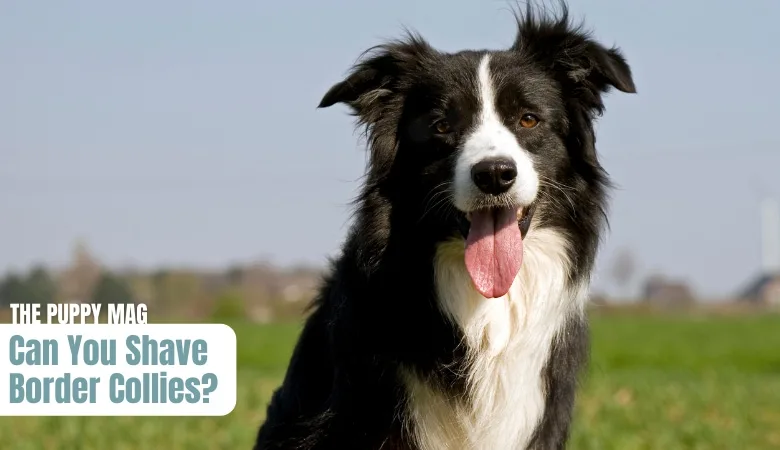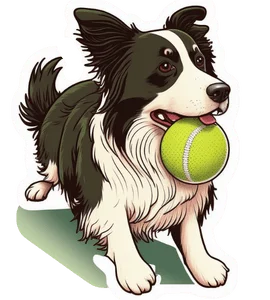Whether or not you can shave a border collie is a common question and it’s asked for various reasons.
This is a topic I’ve discussed for years with collie owners and the answer is important.
This article explains everything you should know about shaving a border collie.
Without needing to skim the whole article, here’s the low down…
Border collies should never be shaved unless it’s needed for a medical reason. Shaving makes it hard for collies to regulate body temperature, protect themselves against bugs and insects, exposes their skin to harsh UV rays, and could cause long-term coat damage.

Table of Contents
Can You Shave a Border Collie?
I often see this question phrased as “can” I shave my collie. Technically speaking you certainly can. But “should” you, is a better way to think about it.
Border collies should never be shaved. Even in hot conditions, a border collie will be better prepared to regulate body temperature with their coat intact. Additionally, shaving a double-coated breed just once could ruin their coat for many years.
There may be times when light trimming is appropriate, which I will cover further below, but “shaving” is always a big no.
It’s understandable to think that shaving might help your collie feel more comfortable and cool. I can totally see the logic behind it.
Unfortunately, shaving your border collie’s coat off will not provide her with the benefits intended. In fact, the opposite happens and shaving only creates more problems which I will explain below.
5 Reasons Why Border Collie Should NOT Be Shaved
Let’s run through a few different reasons why it’s essential to keep your collie’s double coat intact all year round, no matter what.
1. UV Ray Protection
The outercoat, otherwise known as the top-coat is made up of protective guard hairs that are stronger and resistant to many things, one being UV Rays.
That’s right, the topcoat actually protects your collie’s skin from the strong UV Rays not just in summer, but in winter too! These hairs will also be the first to go if you shave your collie, exposing her skin to the sun’s rays.
2. Blocking Direct Heat
Similar to how the guard hairs block UV Rays, it also blocks a lot of the sun’s direct heat from reaching the skin.
It seems like the thick hair will absorb and keep your collie warm but it’s not as simple as that. It turns out that having the thick coat prevents your collie from getting as hot as she would if she didn’t have it.
3. Protects Against Bugs and Insects
Another very important, yet overlooked aspect of the topcoat is to protect against bugs and insects.
Depending on where you live in the world, there will be various flying insects that bite, particularly mosquitos. The thick coat on your collie stops most insects from gaining access to the skin. This protection is instantly lost if the coat is shaved.
4. Warmth In Winter
Although most of this article has been about the summer months and warm weather, winter is still important too! Having a full-grown undercoat provides a layer of insulation and helps your collie to retain her body heat.
If her coat was shaved off in summer, it most probably wouldn’t have grown back by winter, or as I am about to explain below, you’ll have a much bigger issue to deal with.
5. Water Resistance
The outercoat is somewhat water-resistant and this provides your collie with excellent protection throughout wintertime and cold weather.
If it wasn’t for the water-resistant properties that the outercoat provides, your collie would not handle winter as well as she does already.
As soon as dogs become wet, they practically lose all of their ability to remain warm. This would make exercising your collie throughout winter extremely hard, and even dangerous.
This content was originally produced and published on www.thepuppymag.com

Quick update! You gotta check out Brain Training For Dogs! It’s a scientifically-proven method for improving a dog’s behavior and intelligence. With these specific brain training exercises, you can help your collie become more obedient and less destructive without a fuss. Okay back to the post!
How Shedding Helps To Keep Your Collie Cool
As any border collie owner knows, shedding happens pretty much consistently all year round, apart from in springtime and just before winter, when it increases dramatically.
● The undercoat, which acts as insulation in winter, will almost shed itself completely by summertime, leaving just the outercoat.
● The outercoat doesn’t impede the skin’s ability to expel heat, and as it’s not sitting tight against the skin, it also allows for plenty of air-flow throughout the coat. This helps your collie regulate their temperature throughout the summertime.
Your Collie Regulates Heat In Other Ways
Although shedding helps with body temperature regulation, it’s not even the main way that dogs keep themselves cool! Oh no…
● Panting and sweating are the two main ways that Border Collies (and all dogs) regulate their own body temperature, which has nothing to do with their coat!
Your border collie will sweat primarily through her paws from what are called merocrine glands (sweat glands).
So from the last two sections, you now know that shaving the coat is not only ineffective, it actually makes matters worse.
Shaving Can Ruin The Coat For Years
If all of that wasn’t enough, this should be. Shaving both layers back together can potentially cause long-term damage for years to come.
Now, I must emphasize potentially* As in a lot of cases the hair will regrow.
We have an entire article dedicated to how a border collie’s coat regrows.
After having their coat shaved off to a very short length, the undercoat will naturally outgrow the topcoat, and this creates a big problem.
As the undercoat grows faster, it will often tangle, mat, and eventually bind with the outercoat. This completely ruins the overall coat creating almost a velcro texture to it. If this happens, it’s immensely difficult to repair.
When the coat mats together like this, both layers are not able to perform their important roles as they are supposed to. The coat will no longer shed as it should do, it won’t be able to protect against the sun, and it will actually cause overheating.
The risk of the coat not being able to regrow is increased if your collie already very old or has existing health problems.
Will this always happen? Probably not, but as the risk is so great, it’s definitely not worth taking the chance!
Other Popular Border Collie Article:
Are Border Collies Good With Kids? FAQ’s For Parents
Mental Stimulation Tips That Every Border Collie Owner Should Know
Can You Trim Your Border Collie’s Coat?
Light trimming can sometimes benefit your collie and won’t ruin her coat as shaving will.
To be clear, trimming is not the same as shaving. Trimming generally means snipping a small amount of hair off with scissors, in areas that may consistently irritate her.
Sometimes the hair on your collie’s tail, around the paws, and around the ears can get very long.
● Excess hair around the tails and paws can get very dirty, especially when trailing behind during walks at the dog park, so trimming in these locations is understandable.
● Excess hair around the ears can also become problematic and irritate your collie, so once again, trimming back the hair here is fine and will only benefit your collie.
So that’s it… Unless your collie has long hair that’s irritating her, trimming should also be avoided just like shaving.
Thank you for reading! I hope this has sufficiently answered your thoughts about whether you should shave your collie’s coat. If you have further questions, please contact me! I am always happy to hear feedback and adjust my article if needed. All the best, Harry.
Back to more Border Collie articles >>
